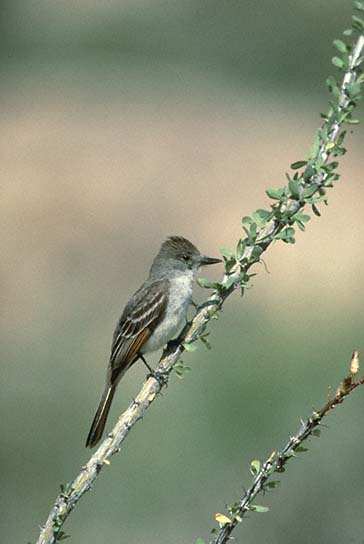
Description: 8" (20 cm). Dull olive above, yellowish below. Like Brown-crested Flycatcher (and Great Crested, Myiarchus crinitus, of the East), but smaller and less colorful; back browner, throat and breast grayish white.
Habitat: Deserts with cactus and mesquite thickets; also dry woods.
Nesting: 4 or 5 brown-spotted, creamy-white eggs in a nest lined with vegetable fibers in a tree or a cactus hole.
Range: Breeds from Washington and Wyoming south to southwestern United States, east to Texas. Rare on Atlantic Coast in late fall, when it is the only Myiarchus likely to occur. Winters in southern California and Arizona southward.
Voice: Purreeeer, similar to call of Brown-crested Flycatcher but softer. Also a soft ka-brick.
Discussion: The Ash-throated Flycatcher lives in the hottest, driest parts of the West, but is also found farther north in dry, shady, open woodlands. These birds launch their pursuit of insects from the dead upper branches of mature trees at the edges of woods. Trunk rot in these trees creates cavities useful as nesting sites. Open nests would be too exposed in the sparse foliage of this dry habitat, transitional between woodland and open range. Although this flycatcher has become a hole-breeder, it still builds a nest and has streaked, camouflaged eggs like its open-nesting ancestors.